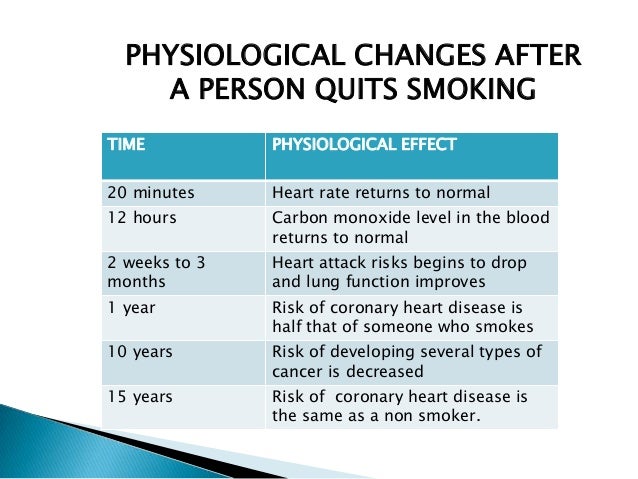
Image source: https://image.slidesharecdn.com/nicotineaddiction-130801110215-phpapp01/95/nicotine-addiction-6-638.jpg?cb=1375354972
Two Serious Challenges Faced By People Quitting
There are two main challenges that smokers face in deciding to quit nicotine: physical addiction and psychological addiction.
Theres no question as to the fact that nicotine is physically addictive. Nicotine elevates your mood and raises your heart rate. Furthermore, the low level anxiety that smokers feel when they are withdrawing from the nicotine in their system is chronicit only recedes during and immediately after smoking. As soon as the amount of nicotine in ones body is reduced, that anxiety starts to build again. The stress it causes is relieved when the smoker lights their next cigarette. This causes them to associate smoking with stress reduction and relaxation. In reality, much of the stress thats being reduced is actually a result of the drug addiction itself.
This creates a feedback loop where they associate not smoking with higher stress levels. And, once you are addicted to nicotine, there is an element of truth to this. The nicotine molecule is a perfect fit for certain neurotransmitters in the brain, which means that when nicotine is present, the addicts brain releases hormones like dopamine, which cause a feeling of happiness and relaxation. On the other hand, when nicotine is absent, the body doesnt release those hormones in a naturally regulated way, which means that the individual experiences high levels of stress and anxiety. In short, they feel unhappy and the only solution seems to be smoking again.
But its not simply the physical aspect that presents a challenge. All of the other aspects of smokingsocializing while smoking, taking a break to collect ones thoughts, the feel of the smoke in ones mouth and lungs, and so forth, become associated with relaxation and peacefulness. That means that smokers often reach for a pack of cigarettes when they are stressed about other thingsnot just a lack of nicotine. A tough day at work, an argument with a loved one, a stressful commute; all of these things and more can result in a cigarette craving. Even when the physical addiction is conquered, every day stressors can trigger the desire to smoke.
Overcoming these Challenges
In order to quit with any measure of success, smokers must address both the physical and the psychological aspects of smoking. The physical addiction can be addressed by titrating down the dosage of nicotine one receives, which smokers may do with products like nicotine patches or gum. Another method, involving medication, involves usurping the neurotransmitters that nicotine attaches to, which means that even if the smoker does break down and light a cigarette, they dont receive the positive feedback via hormone release that they otherwise would.
Overcoming the physical addiction is difficult, but the psychological addiction often persists beyond the physical addiction. Smokers need to learn new routines to manage their every day stresses. Some may have a cup of tea instead of a smoke, engage in more physical exercise to regulate their moods, cut back on anxiety increasing substances like caffeine, or call a friend to relieve temporary stress.
Read more: 10 advantages of electronic cigarettes - https://vaporcade.com/10-advantages-electronic-cigarettes/
Another method used to quit smoking is to find an alternative method of nicotine delivery. In this case, quitting nicotine isnt the goalthe goal becomes quitting smoking. E-cigarettes and personal vaporizers deliver nicotine without the harmful products produced by combustion of tobacco. These products mimic many aspects of smoking, which makes them an easier replacement for some smokers as compared to patches, etc. They also have more control over the amount of nicotine in the eliquid and can reduce their intake over time.
.JPG)